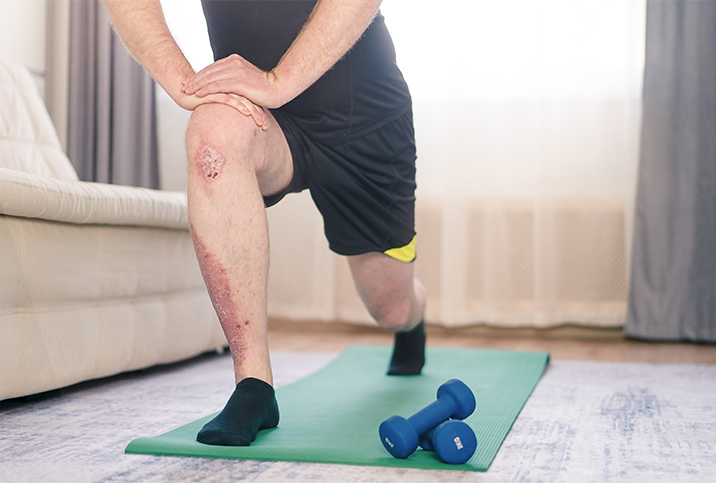What You Need to Know About Genital Psoriasis

Anyone who watches enough TV has probably seen at least one ad for a prescription drug that grants them clear skin. The ad shows people engaging in their favorite activities, maybe swimming or yoga, because they're no longer timid about exposing the skin on their arms and legs.
The people in these TV spots are enjoying freedom from the visible effects of psoriasis, an autoimmune skin disease that causes a buildup of skin cells on various areas of the body. It often presents itself between the ages of 15 and 25 and doesn't discriminate among genders.
Typically, psoriasis affects the hands, feet, scalp, face or neck. Sometimes it can affect the genitals by spreading from other parts of the body.
Fortunately, it's not contagious and typically arises from genetics or environmental factors, although it's not entirely clear how someone develops the disease.
According to the National Psoriasis Foundation, as many as two-thirds of psoriasis sufferers experience genital psoriasis at some point, but psoriasis rarely affects the genitals in isolation. Genital psoriasis can affect the penis, scrotum, thigh crease, anus and any skin related to the genital area. Flakes, rashes, itchiness and redness on your penis can all be signs of genital psoriasis, especially if psoriasis is present on other body parts.
The appearance of genital psoriasis
Systemic inflammation is a common symptom across the different types of psoriasis, and two types can affect the penis differently: inverse psoriasis and plaque psoriasis. Inverse psoriasis presents in the genital area as smooth red skin (not scaly) that may look tight. Plaque psoriasis can appear bright red or purple, and in either flat or raised patches.
Treating genital psoriasis
Genital psoriasis, since it directly relates to the skin and inflammation, is treated by a dermatologist or a rheumatologist.
"It won't be treated any differently than psoriasis elsewhere in the body," said Joseph Pazona, M.D., a urologist with his own practice in Nashville, Tennessee.
Psoriasis can flare up when factors such as cold and dry weather, stress or skin infections come into play. Treatment typically includes topical steroid creams or ointments that decrease the inflammation and stop skin cells from growing as quickly. People with moderate to severe psoriasis might be prescribed oral or injected medications for brief periods of time between using creams.
Sunlight also helps the skin recover, which is why light therapy can be helpful. According to Mayo Clinic, light therapy involves exposing the skin to specific and measured amounts of natural or artificial light, with repeated treatments being necessary.
Even if treatment is successful, though, psoriasis is a chronic condition that can reappear throughout a person's life. The key is to manage the pain and flare-ups before they spread to other parts of the body.
An important note: Scratching the itch can make the plaques worse and increase the risk of infection, even in the genital area.
Genital psoriasis has sexual side effects
"Anything that causes skin breakdown and inflammation to the genitals is going to make sexual activity uncomfortable," Pazona said. "So, in addition to treating the underlying condition of psoriasis, it's important that men use plenty of lubrication to reduce any friction in that area."
Psoriasis is not a sexually transmitted disease, so it can't be passed to a partner during intercourse, but it might be painful and uncomfortable if left untreated and could lead to infertility. Impaired sperm parameters and reduced testosterone levels have been found in men with psoriasis, according to a study published in 2017 in the journal Dermatology.
Unfortunately, a cure for psoriasis has yet to be found, but seeking treatment can help prevent it from spreading to your genitals.


















